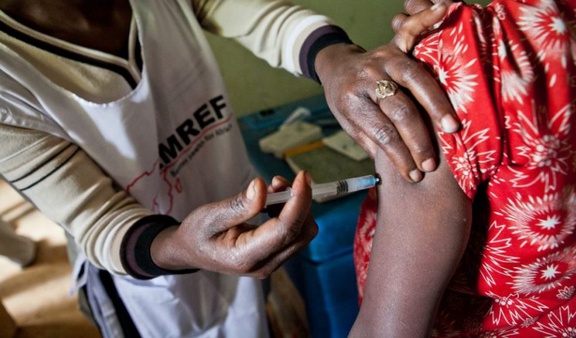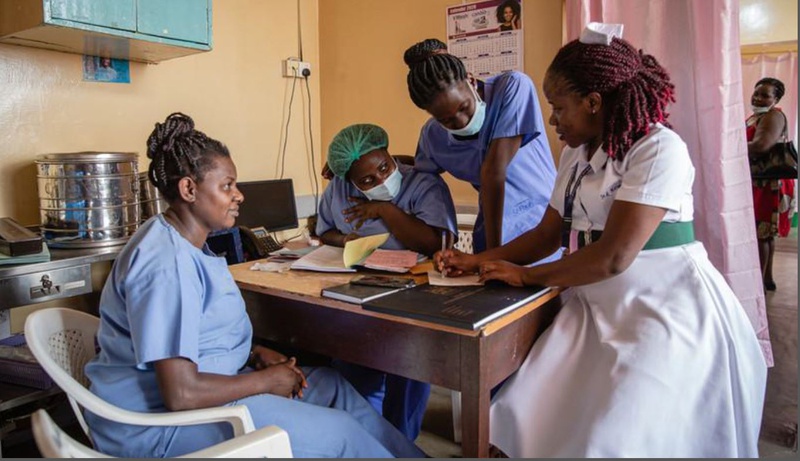AMREF Health Africa - Covid vaccination campaign

This year, AGE web solutions has decided to donate to humanitarian projects of AMREF the amounts that are normally used for Christmas gifts for its clients and collaborators.
We have decided to support AMREF Health Africa, a non-profit, independent, non-partisan, and non-denominational organization committed to development cooperation activities dedicated to promoting the right to health for Africa and Africans.
The contribution offered by AGE web solutions has been used to support training activities for 22 healthcare workers in Africa on COVID-19 vaccination (in synergy with the Ministry of Health).

COVID, VACCINES AND POVERTY: THE ALARM FROM AFRICA
As of January 3, 2022, Africa has 9,756,457 cases and 228,856 deaths related to COVID-19 (source Africa CDC, January 3, 2022).
Across the entire continent, the virus is more frightening today than at the beginning of the pandemic, because it is rapidly reaching rural areas, which are less equipped and therefore more in need of support.
In Africa, COVID-19 finds a great ally in poverty: the existing infrastructural deficiencies, limited skills, and vast distances complicate the planning of the vaccination campaign, from reaching communities to maintaining the cold chain. But the biggest obstacle is the lack of the necessary funds to purchase vaccines from the manufacturing pharmaceutical companies, none of which are present in the African territory.
To achieve the goal of vaccinating at least 60% of the population (about 780 million Africans), Africa will need approximately 1.5 billion vaccine doses which, according to current estimates, could cost between 8 billion and 16 billion dollars, with additional costs of 20-30% for the vaccination distribution program.
AMREF AND THE RESPONSE TO COVID-19
In response to the health emergency, AMREF Health Africa acted promptly and on multiple levels. On the ground, in the many countries where AMREF is present, it reached over one million people, providing care and information. It also trained more than 100,000 doctors, nurses, and healthcare workers on COVID-19 prevention and management measures and provided personal protective equipment. Finally, AMREF equipped its Flying Doctors – the "flying doctors," who operate on small airplanes, essential for reaching remote areas – by providing them with capsules for the transfer of the most severe COVID patients.
The action was swift and effective thanks to the deep knowledge of the territory, the synergy with local communities and institutions, and the established experience.
In view of the launch of a massive vaccination campaign on the African continent, to date AMREF:
- It has trained thousands of healthcare operators, particularly in the community, on the correct administration of the vaccine.
- It has set up, where necessary and in constant collaboration with national governments, new vaccination centers, important to prevent overcrowding and subsequent infections and to avoid the interruption of other health services.
- It has arranged missions with mobile clinics, ready to depart and reach even the communities in the most remote areas.
- It is carrying out important awareness-raising actions to reduce vaccine hesitancy among communities.
- It is organizing escort services for people to vaccination centers, to also break down the barrier of distance.
THE OBJECTIVES OF AMREF
The mission of the AMREF Health Africa vaccination program is to stop the morbidity and mortality of COVID-19 in Africa, as well as its indirect consequences, ensuring that everyone has access to the Coronavirus vaccine, and that no woman or man is left behind.
To achieve an effective and efficient mass distribution of the vaccine, it is necessary to support the entire spectrum of the program starting from production.
What AMREF Health Africa is doing:
- Supports the management of the cold chain, that is, how to transport temperature-sensitive vaccines to places without electricity and reliable refrigeration. Strengthening the cold chain - a network of vehicles, refrigerators, and cold storage units that allows the transport of the vaccine from the manufacturer to the immunization point - is essential for countries preparing to receive the vaccine, particularly for the Pfizer vaccine which must be kept at -75° C.
- Supports the planning of the internal distribution of the vaccine, the request, and the monitoring of supplies in healthcare facilities. The African Union has secured 270 million doses of vaccine to be distributed across the continent, which adds to those promised by the global vaccination program COVAX, but is below the demand of the region.
- Leads training sessions aimed at doctors and nurses on COVID-19 vaccination.
- Supports governments to integrate COVID-19 vaccination services into healthcare facilities, with the aim of minimizing disruption to regular activities. Mass vaccination will enable operators to separate vaccination centers from existing healthcare facilities: these centers will serve to prevent overcrowding in healthcare facilities and ensure that other health services are not interrupted.
- Sdevelops and disseminates accurate messages about the vaccine, with the help of emails, informational posters, and other channels. Healthcare providers must easily find information about vaccines, how they are developed and monitored for safety because to create massive demand for the vaccine, it is essential to first build patients' trust in vaccines, and to achieve this, it is necessary to engage healthcare personnel.
- Leads community projects to mobilize communities for vaccination through the involvement of volunteers, local health offices, and operators. 4